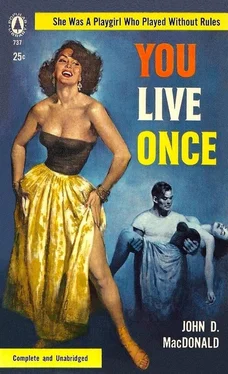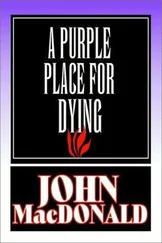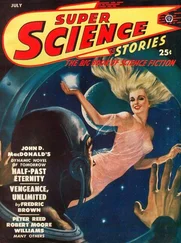I said I would. It would be pleasant to see Nancy, at least. When the sun had dried me I said goodby to Marilyn, who pouted at me for leaving. There was no need to say goodby to anyone else.
I drove down the lake shore road to the sign which said, in copper and stained wood, RAYMOND. Each year Dodd’s mother moved up to the small, comfortable camp at the lake with her nurse as soon as the weather was warm enough, leaving, this summer, the big house in town for Dodd and Nancy rather than closing it up. I imagined that it was a relief to Nancy to have the house to herself. Mrs. Raymond was an imposing, stone-faced, white-haired woman in her sixties, confined by arthritis to a wheelchair. She had positive opinions, and achieved emphasis through repetition. In her scale of values the fact that I worked for Dodd put me on almost the same social footing as the brawny Irish nurse who lifted her in and out of her wheelchair.
I parked the car in the drive and went around to the front where I knew they’d be. The shoreline is steep at that place. There is a patio on the lake side, and steep wooden steps that go down to the shallow beach. Dodd had changed to bright yellow shorts, and he had a can of beer in his hand. Mrs. Raymond sat in her wheelchair in the shade of a big beach umbrella. Nancy was stretched out on a padded chaise longue with wheelbarrow handles and wooden wheels. Her smile was what I had come to see.
“Well, young man,” Mrs. Raymond said, “I suppose they’re all running around in mad circles up at the Pryors’ now that it’s too late.”
The final two words gave me a jolt. “Too late, Mrs. Raymond?”
“Of course it’s too late. White slavers.”
“Please, Mother,” Dodd said. “Can I get you a beer, Clint?” I nodded.
“White slavers,” Mrs. Raymond said firmly. “You don’t hear much about them. They keep it out of the papers. You wait and see. Even if they didn’t get her this time, they’ll get her next time. You wait and see.”
Dodd came back out of the kitchen and handed me a cold beer. “Mother has them crouched behind every bush.”
“You can make it sound ridiculous all you want. You can jeer at me. But did they ever find the Cornwall girl? Did they? Did they ever find the slightest trace of her? No, and they never will. After what they do to them they’re ashamed to come home,” she said darkly.
“Maybe she just decided to go on a trip or something,” Nancy said.
“Ha!” said Mrs. Raymond. Nancy’s opinions always got a similar response. I suspected that Mrs. Raymond resented Nancy not only because she had married an only son, but because after some six years of marriage Nancy had yet to come up with a grandchild for her.
Nancy was wearing a figured grey sunsuit thing, with a sort of skirt effect. She stretched and said, “Gosh, the sun is making me sleepy. Anybody want to walk on the beach?” Her glance swept across me meaningfully and I rose to the hook.
“I’d just as soon.”
“You two go ahead,” Dodd said casually. A bit too casually, I thought.
We went down the steep wooden stairs, Nancy first. She is my favorite candybox blonde. Small perfect delicate features, silky floating hair. She has a thin little-girl voice with overtones of a lisp cured long ago. However, there is a level honesty and intelligence in her blue eyes that keeps her from being insipid. Her figure is flawed, if you can consider it a flaw. I have no doubt that she does, because her clothes, even the sunsuit, are styled to de-emphasize the flaw. She is very long-waisted. Her torso, discernible through any clothing, is long, ripe, muscular, perfectly formed. You see such torsos carved in old marble a lot oftener than you see them on people. Were her legs in proportion Nancy would be six feet tall. But the lovely torso rests on short heavy legs. They are shapely, but they do not fit. Understand, it is not something you see immediately. After you see her a few times you begin to realize that though she is lush indeed, the proportions are subtly off. Then you see why. Her hips are too far from her head, and too close to the ground.
We walked to a pine log a hundred yards up the beach.
“He’s pretty upset,” she said.
“Yes.”
“Clint, do you have any remote idea what could have happened?”
“Not the slightest.”
“It’s damned funny. I... I hope she never comes back.” Nancy said that shyly. We could not talk together of Mary Olan without constraint. She became shy when she remembered the way she had talked the second time we had all gone out as a foursome. Sober, Nancy would not have confided in me — I had been a stranger.
Dodd had set up the first double date. There had been undercurrents of tension that I didn’t understand. Mary and Dodd would begin to close Nancy and me out of the conversation by talking of old friends during the old days in Warren. Then they would remember their manners. Mary’s attitude toward me had been casual and friendly, but to Nancy she was patronizing. Nancy had kept her claws unsheathed just enough so they showed. I chalked that up to the normal stress you would expect between wife and old gal friend. I even assumed that Dodd had decided, since he was going to stay in Warren for some time, that the best way to smooth things out was to throw wife and old gal together and rub the edges off.
For my part, I was pleased. My social contacts in Warren were limited. The guys on my same level in the firm were out there in Brookways, well wifed and bairned. They had me out a few times for dinner. During the evening people would be drifting in and out, and some of them were lovely ladies. But each of the lovely ladies had a husband who just happened to be somewhere else that evening, and a place like Brookways — even if you had the inclination, which I most certainly haven’t — is no place to make passes amid the married set. Compared to Brookways, a fishbowl is a mountain retreat.
There were, of course, the gals in the office. But C.P.P. regards such goings on with a paternalistic frown.
Warren is a tight community. I was part of the new influx of postwar population, and a professional transient at that. The old part of town drew its skirts tightly around itself, talked about the dreadful habits of the “new element,” and quietly raised its standard of living with the money we were bringing in. So I had battered myself into apathy with workouts at the Y, with sheafs of work I brought home from the office, with library books that I had never gotten around to reading before. When restlessness got its sharp little fangs into me, I’d roam the Saturday bars. That is a forlorn pursuit, eyeing the tight-skirt little drabs in the neighborhood joints, or the enameled Vogue-like birds of prey in the dollar-a-cocktail lounges, nursing their pale poison during the five o’clock ritual of appraisal and rejection. The jukes hammer your head and your need is a sickness to be assuaged only by predictable shame.
During my five transient years I had come to learn that the more complex the civilization grows, the more violent are the effects of loneliness. I had learned why C.P.P., G.E., Dupont, Alcoa, Ford, General Motors, Kodak and all the rest of them wanted us safely married. Still, there were a lot of us still single, minds honed keen by Sheffield, Towne, Stanford, Harvard Business, M.I.T., and by day we made things run and move and grow. But by night we paced the neon sidewalks where nylon whispers on hips and ankles, and lipstick shows black when the light overhead is red.
A few times I had reached the point where the act of marriage became a goal in itself, apart from any specific woman. Marriage to a faceless being who was nevertheless all too vivid from the neck down, who by warmth and closeness would still the gnaw of the blood.
Читать дальше








![Джон Макдональд - Wine of the Dreamers [= Planet of the Dreamers]](/books/430039/dzhon-makdonald-wine-of-the-dreamers-planet-of-thumb.webp)
![Джон Макдональд - Finding Anne Farley [= Ring My Love with Diamonds]](/books/430180/dzhon-makdonald-finding-anne-farley-ring-my-lov-thumb.webp)


